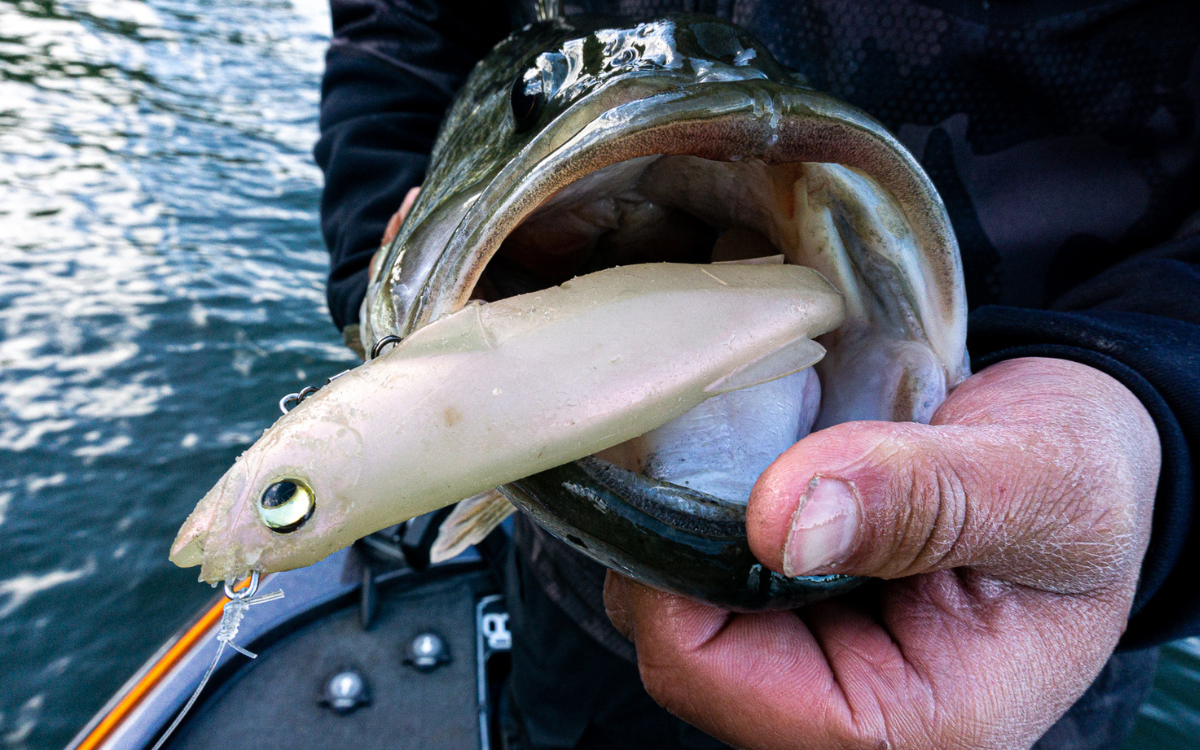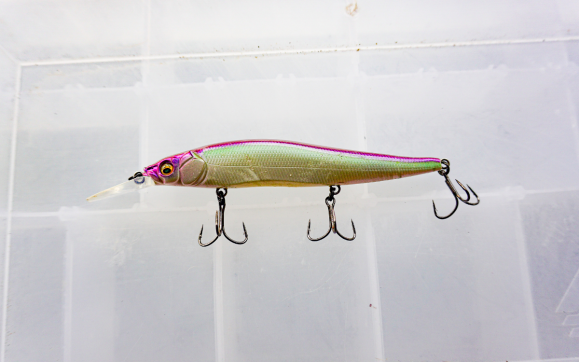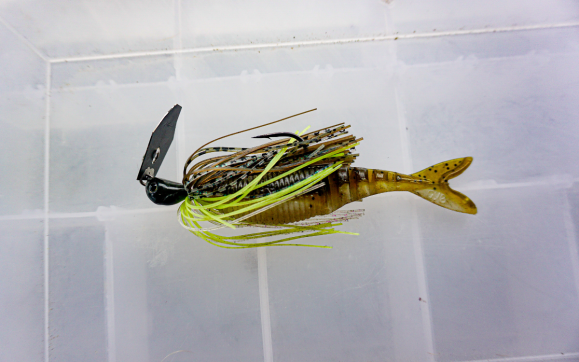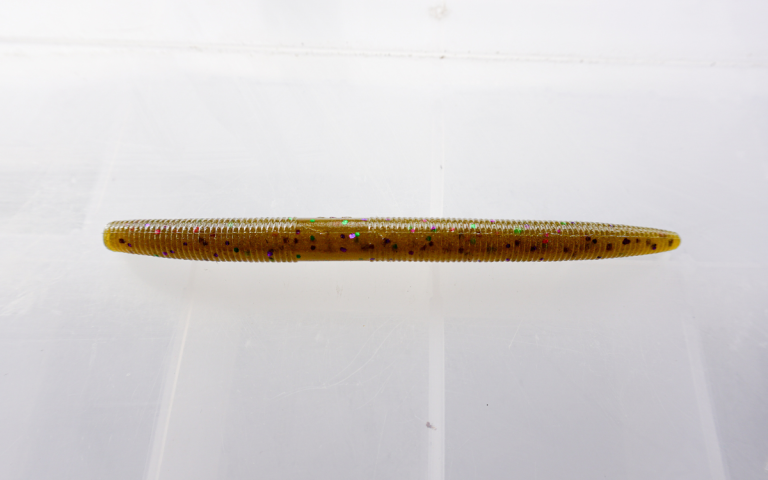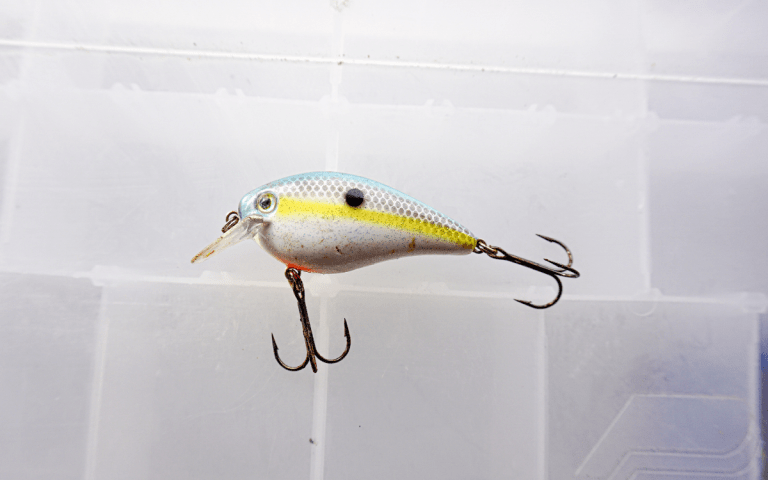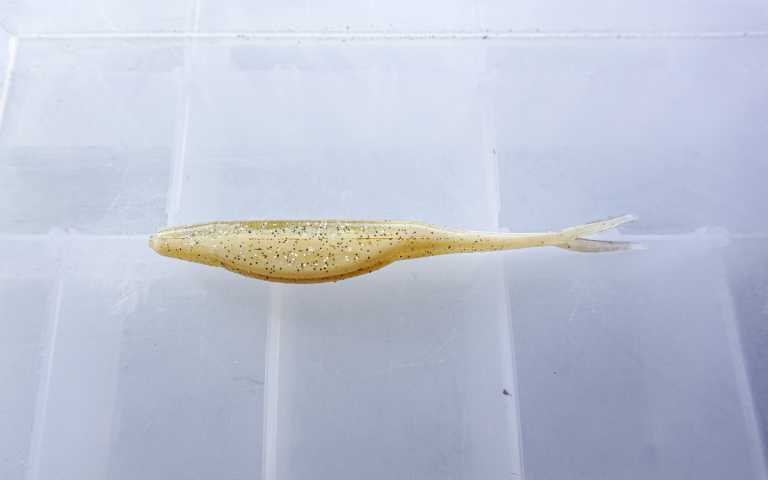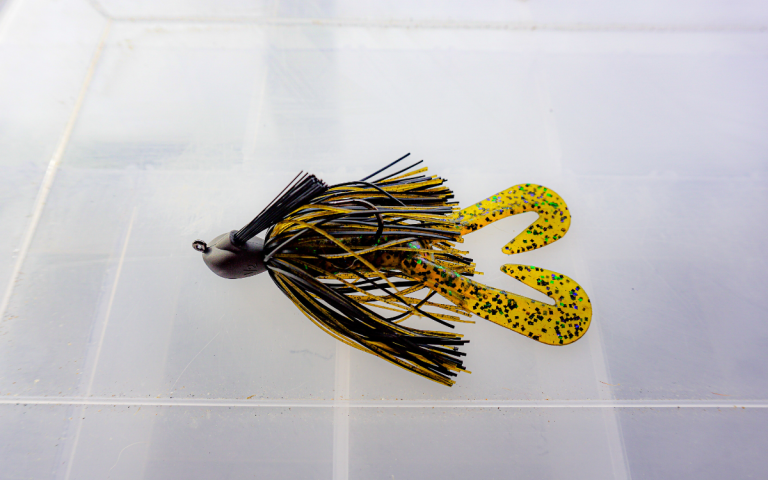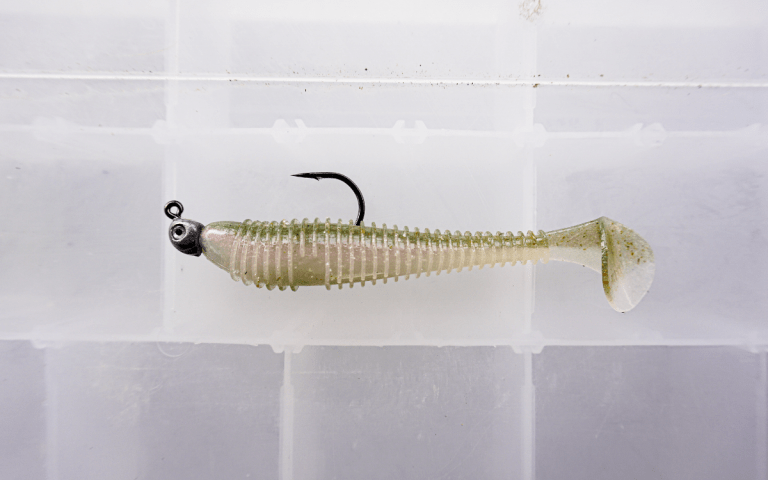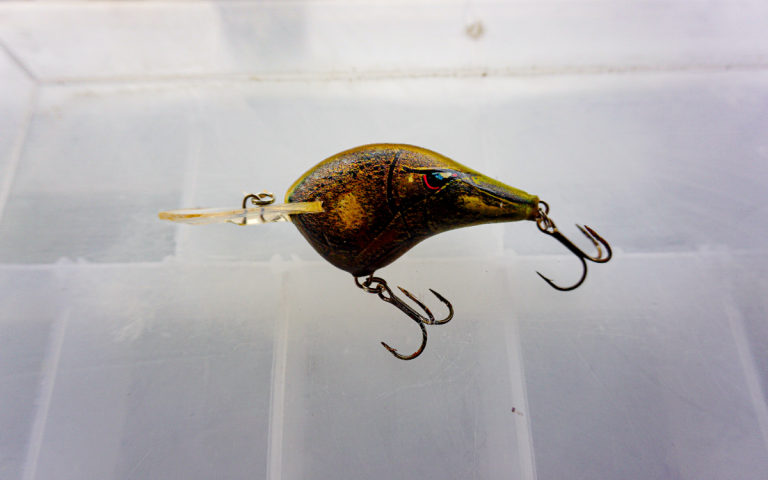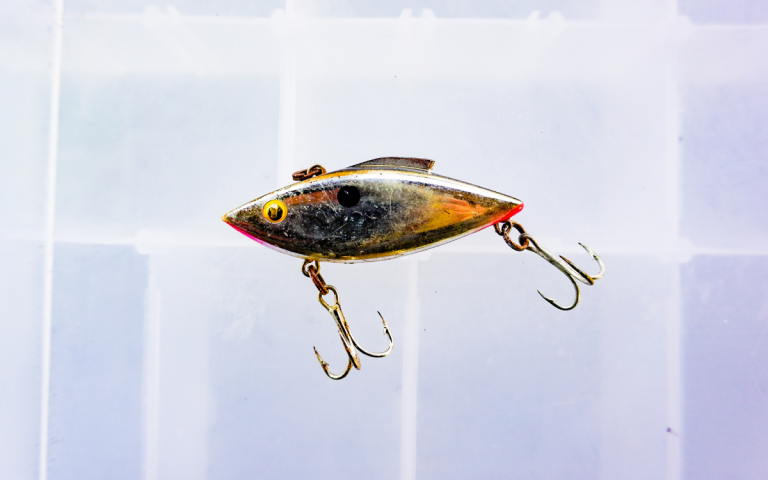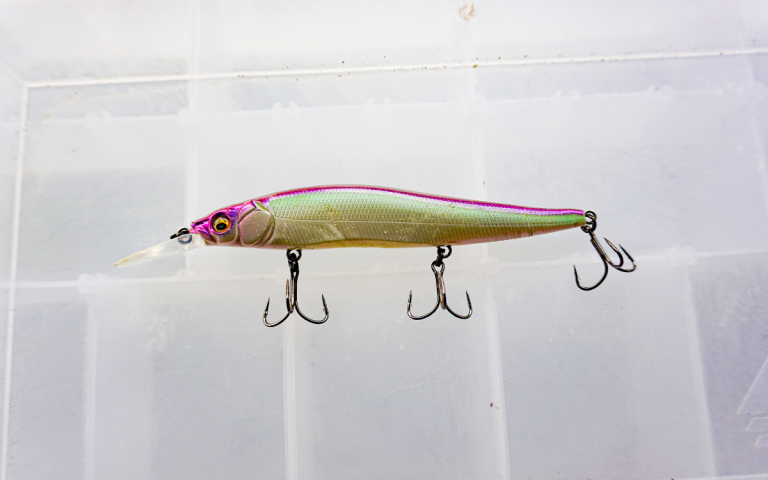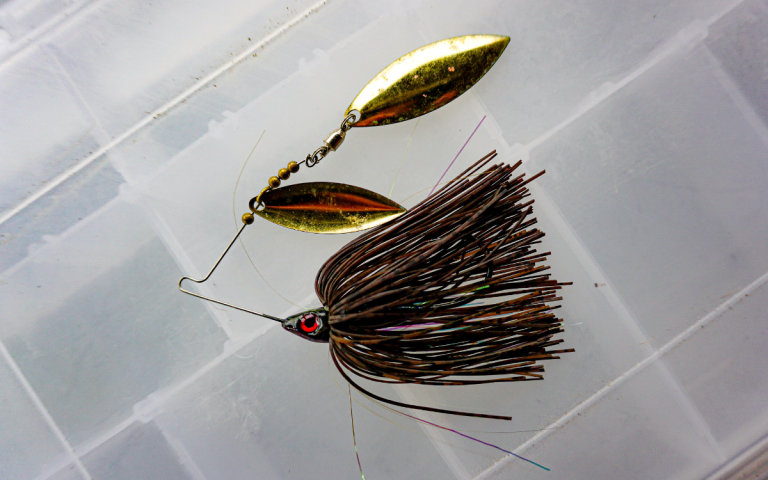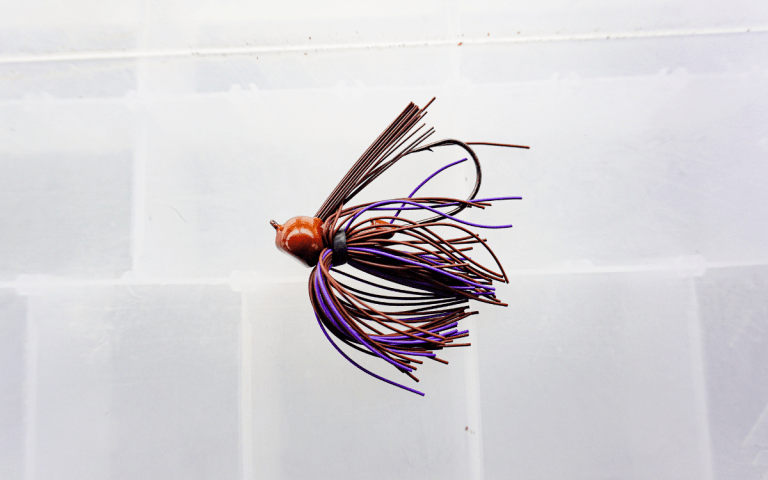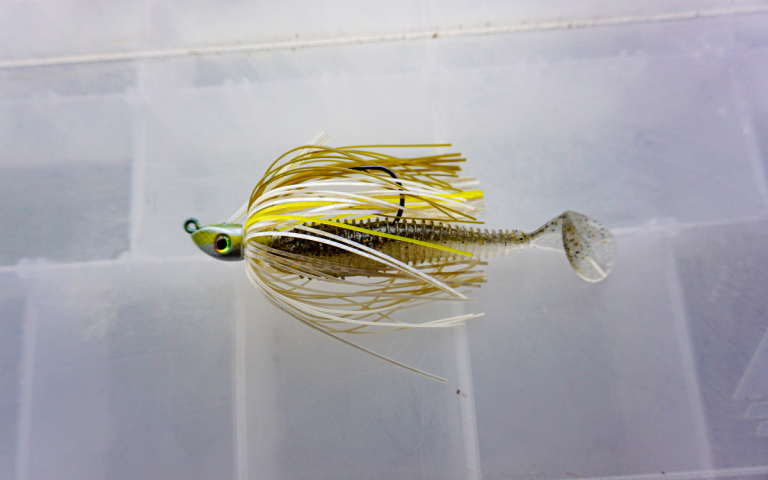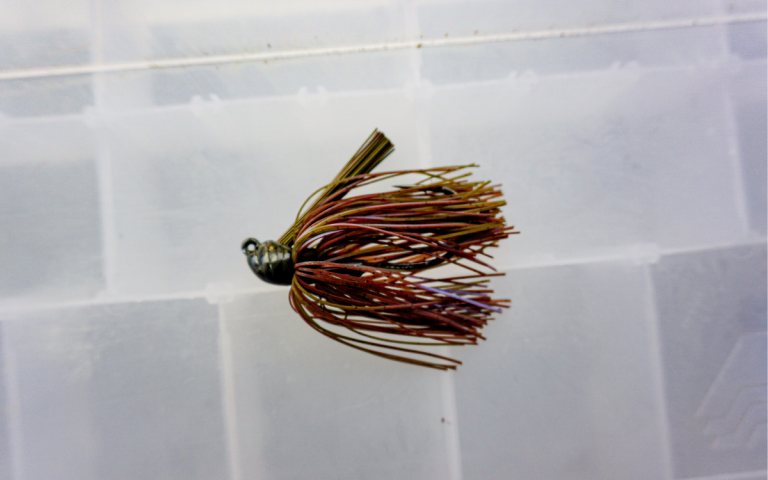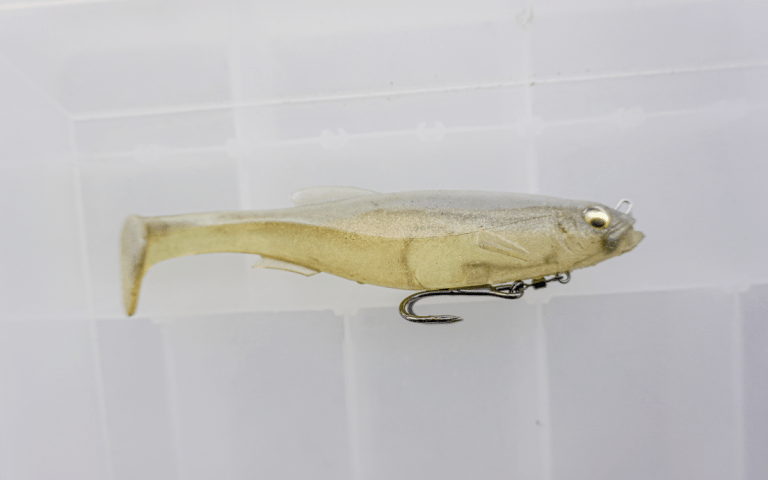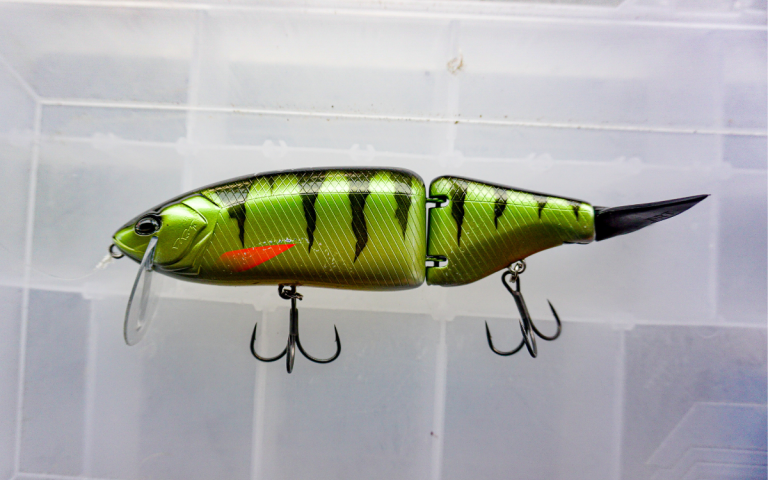We may earn revenue from the products available on this page and participate in affiliate programs. Learn More ›
There are hundreds of bass lures lining the compartments of my boat. I’ve spent a small fortune over the years collecting different lure designs, colors, and sizes to ensure that I’m ready for any fishing condition. That’s because, of course, the best bass lures are seasonally and situationally specific.
So what I’ve assembled here is an arsenal of lures that I think are the best at their specific technique. I’ve covered everything from deep diving crankbaits to topwaters. If you’re a new or casual bass fisherman, consider this to be the ultimate buyer’s guide to beef up bait box.
If you’re an experienced bass fisherman, know that I realize selecting just one bait for every major category is a brazen task. I’ll openly admit that my picks mostly come down to the baits I have confidence in for the given situation. You’re more than welcome to disagree with me, but don’t knock my picks until you’ve tried them.
Topics Covered
- Top 5 Bass Lures of All Time
- Best Crankbaits
- Best Jerkbaits
- Best Chatterbait
- Best Spinnerbait
- Best Jigs
- Best Swimbaits
- Best Topwater Lures
- Best Soft Plastics
- Honorable Mentions
- How I Chose the Best Bass Lures
The Top 5 Best Bass Lures of All Time
For newer bass anglers, the sheer number of lure options available to you can be overwhelming, so take my advice, don’t just start buying one of everything. Instead, start with the five lures that every bass angler should have. These five baits will get you catching bass in any pond, river, or lake around the country.
Best Soft-Plastic Senko: Yamamoto 5-inch Senko
Pros
- Can be fished successfully year-round
- Slow fall rate
- High salt content
- Wide array of color options
Cons
- Not ideal for covering water
- Not very durable
Specs
- Sizes: 3, 4, 5, 6, and 7 inches
- Key colors: Green Pumpkin, Black and Blue, Cinnamon Brown
Prime Conditions:
- Late pre-spawn, spawn, early post-spawn
- Docks, shallow vegetation, submerged timber
I’d be willing to bet that more bass have been caught on a Senko than any other lure in existence. There’s something special about the subtle shimmy as it falls through the water column that drives bass nuts. In my experience, the saltier the stick bait, the longer a bass will hold on after a bite. With that in mind, I’ve almost exclusively used a Gary Yamamoto Senko. The high salt content in their soft plastic stick bait just seems to add more action and increases the fall rate when compared to some other stick baits. In most scenarios, I’ll reach for the 5-inch version and fish it weightless, on a Texas rig, or wacky rigged around shallow cover like laydowns and docks. There are plenty of stick bait options out there, but none seem to deliver as consistently as the Yamamoto Senko.
Read Next: Wacky Rig: A Complete Guide on Rigging, Setups, and How to Fish It
Best Squarebill Crankbait: Strike King KVD Elite 1.5
Pros
- Ideal for covering water
- Deflects off of shallow cover
- Wide array of color options
- Durable
Cons
- Needs to be fished at a certain depth range
Specs:
- Size: 2 ¼”
- Weight: ⅜ oz
- Depth range: 3-6 ft
- Key colors: Rosie, Pro Powder Blue, Chart Sexy Shad 2.0
Prime Conditions:
- Early pre-spawn through late pre-spawn
- Rock covered banks, rip-rap banks, shallow stump fields
Squarebill’s are the shallowest diving crankbaits. They’re designed to be fished up to about 5-feet or shallower. The flat bill and square design will cause this crankbait to wiggle through the water column, and once at depth, it easily deflects off of cover like rocks and stumps without snagging. Typically, you’ll end up getting most of your bites after a deflection, so any time you see or feel the squarebill hit a rock, be ready to set the hook.
I chose the Strike King KVD Elite 1.5 as the ultimate squarebill because it’s a proven fish catcher across the country. It casts well, deflects even better, and the bass can’t seem to resist it. Plus, if the best bass angler of all time designed it, it’s worth tying on your line.
Best Soft-Plastic Jerkbait: Zoom Fluke
Pros
- Great for covering water
- Can be rigged weedless
- Erratic action underwater
Cons
- Not very durable
Specs:
- Size: 4”
- Key colors: White Ice, Baby Bass, Electric Shad
Prime Conditions:
- Late pre-spawn and early post-spawn
- Shallow vegetation, bank fishing, shallow stump fields
The downfall of hardbody jerkbaits is their inability to come through grass or structure without getting snagged. But, fishing a jerkbait style lure near shallow cover is one of the best ways to catch big bass throughout the year.
In this scenario it’s time to tie up a weightless Zoom Fluke. Simply cast and retrieve like a hardbody jerkbait to give this soft-plastic bait some incredible darting action that bass can’t resist. Compared to other fluke style baits on the market, the Zoom Fluke is more durable and its simple design offers a better action, making it your best bet. Whether it’s spring or fall, a fluke will help you catch bass that are keyed in one baitfish.
Best Casting Jig: Keitech Casting Jig
Pros
- Can be fished successfully year-round
- Can be fished in a multitude of ways
- Durable
Cons
- Not ideal for covering water
- Will get snagged in thick cover
Specs:
- Weight: ⅜, ½ ounce
- Key colors: Green Pumpkin, Black and Blue, Green Pumpkin Craw
Prime Conditions:
- Spawn and post-spawn
- Docks, submerged timber, offshore rock piles
Every bass angler needs a jig when they’re getting started. While there are plenty of jig design options available, it’s hard to go wrong with a simple casting jig. You can drag it, swim it, hop it, or even flip it into shallow cover effectively. My go-to is the Keitech Casting Jig because it’s a very small profile tungsten jig that really matches the size of the crawfish in my region of the U.S. (the Northeast) and it’s got a sturdy hook that keeps bass hooked up throughout the fight. If there are smallmouth to be caught, this jig will get the job done.
Best Soft-Plastic Paddletail: Keitech Swing Impact FAT Swimbait
Pros
- Ideal for covering water
- Can be fished by itself or used as a trailer
- High salt content
Cons
- Durability can be an issue
Specs:
- Sizes: 2.8, 3.3, 3.8, 4.3, 4.8, 5.8, 6.8, 7.8 inches
- Key colors: Electric Shad, Bass Candy, Smallmouth Magic
Prime Conditions:
- Pre-spawn and early post-spawn
- Bluff walls, open water, swimming above offshore structure
To round out our top five selections, we can’t ignore the reliable soft-plastic paddletail swimbait. Whether you’re rigging it as a trailer on a chatterbait, swim jig, Alabama rig, or threading it on an empty jig head to swim along a bluff wall, the Keitech Swing Impact FAT Swimbait is a killer choice. It’s made of a durable plastic that’s loaded with salt to help keep those bass holding on long enough for you to bury the hook. There are plenty of colors available, so just remember to match the hatch.
The Best Crankbaits
Each crankbait has a very specific diving depth associated with the bill or lack thereof. Rather than oversimplifying and picking one crankbait to rule them all, I’ve broken it down to four choices to consider depending on the depths you’re fishing in.

Best Mid-Depth Crankbait: Storm Original Wiggle Wart
Pros
- Ideal for covering water
- Deflects off of cover well
- Wide array of color options
- Durable
Cons
- Needs to be fished at a certain depth range
- Stock hooks aren’t very sharp
Specs:
- Size: 2”
- Weight: ⅜ oz
- Depth range: 7-12 ft
- Key colors: Red Craw, Watermelon, Tennessee Shad
Prime Conditions:
- Pre-spawn
- Submerged timber, rock piles
If you’re trying to catch bass along the first drop off, a mid-depth crankbait will typically be a great choice. Whether it’s the pre-spawn or post-spawn, bass love to stage in 5- to 10-feet of water and ambush prey as it comes by. It’s also worth noting that most of the structure in a lake will be found at these depths, whether it’s a rock pile, stump, submerged tree, or even dock pilings. When trying to land bass in this depth range, the Storm Original Wiggle Wart is the undisputed champion. It quickly dives to the correct depth, deflects off of cover easily, and the bass can’t get enough of it.
Best Deep-Diving Crankbait: Rapala DT14 Series
Pros
- Ideal for covering water
- Deflects off of deep cover well
- Wide array of color options
- Durable
Cons
- Needs to be fished at a certain depth range
- Stock hooks aren’t very sharp
Specs:
- Size: 2 ¾”
- Weight: ¾ oz
- Depth range: 14 ft
- Key colors: Citrus Shad, Dark Brown Crawdad, Silver
Prime Conditions:
- Post-spawn
- Ledge fishing, road beds, deep rock piles
When the bass head to deep water during the middle of the summer, most folks turn to finesse presentations like drop shots or Ned rigs, but if you want to stand out from the crowd and catch some giants, tie on a Rapala DT14 Series deep-diving crankbait. Compared to other deep-diving crankbaits out there, the DT14 has a wide wobble and the slimmer bill design allows it to cut through the water column and reach its maximum depth faster, meaning your bait will spend more time in the strike zone. To fish this lure effectively, you’ll need to find offshore rock humps, road beds, or other deep structure that bass and baitfish will want to call home. Cast out past the fish and reel your crankbait right into their wheelhouse.
Best Lipless Crankbait: Bill Lewis Rat-L-Trap
Pros
- Ideal for covering water
- Rips through grass well
- Wide array of color options
- Can be fished shallow or deep
- Durable
Cons
- Will get stuck in hard cover like rocks or laydowns
- Stock hooks aren’t very sharp
Specs:
- Size: 3”
- Weight: ½ oz
- Key colors: Chrome Black Back, Red Crawfish, Baby Bass
Prime Conditions:
- Pre-spawn
- Shallow or deep aquatic vegetation
The lipless crankbait is one of those lures that seems to have been forgotten over time, but serious bass anglers know they can still catch fish when the going gets tough. A lipless is most effective around aquatic vegetation, typically in colder water temperatures, as the grass is just starting to emerge for the season. You’ll simply cast out and yo-yo the lipless back to the boat, allowing it to rip through the grass aggressively. This causes reaction strikes that might take the rod right out of your hand. The Bill Lewis Rat-L-Trap was one of the originals when it came to lipless crankbaits, and it’s still one of the best options. The flat top creates a lot of resistance when you rip the bait, and it’s full of beads that make a racket underwater. The size and shape are perfect for matching most prey species bass love to hone in on as well.
The Best Jerkbaits
One of the best ways to catch bass is with some form of baitfish imitation. The goal is to offer a unique presentation, giving your lure action that will cause a bass to strike without a second thought. Whether you’re picking a hardbody jerkbait, or going with a soft-plastic option, it’s undeniable that jerkbaits flat out catch fish. The two below have landed me hundreds of bass over the years in almost every body of water I’ve fished in.

Best Hardbody Jerkbait: Megabass Ito Vision 110+1
Pros
- Ideal for covering water
- Wide array of color options
- Stock hooks work well
- Durable
Cons
- Will get snagged in hard cover like rocks or laydowns
- Expensive
Specs:
- Size: 4 ⅓”
- Weight: ½ oz
- Key colors: French Pearl US, Megasbass Sexy Shad, GG Deadly Black Shad
Prime Conditions:
- Pre-spawn
- Bluff walls, open water, over top of submerged timber
Ask any diehard bass angler to pick their favorite hardbody jerkbait and I’d be willing to bet 9 out of 10 go with the Megasbass Ito Vision 110+1. These lures are quite expensive, but in my opinion, they’re worth every penny. The action they produce underwater perfectly represents a dying baitfish darting back and forth quickly. Plus, the angle at which they suspend imitates a nose down, dying baitfish to the letter. Sure, you can catch fish on cheaper choices, but if you’re looking for a banner spring day of jerkbait fishing, look no further than the Vision 110+1.
When Hank Cherry won his first Bassmaster Classic on one, his sponsor Berkley immediately got to work on replicating the Vision 110+1 as closely as they could. Cherry never admitted what he was throwing, but fans of the sport could tell from the live footage. As with anything, imitation is the biggest form of flattery, and the 110+1 has received a lot of flattery in recent years.
The Best Chatterbait: Z-Man Evergreen Chatterbait Jack Hammer
Pros
- Ideal for covering water
- Wide array of color options
- Tungsten jig head makes different noise than lead
- Durable
Cons
- Paint chips off of blade easily
- Expensive
Specs:
- Weight: ⅜, ½, ¾, 1 ¼ oz
- Key colors: Fire Craw, Bhite Delight, Black Blue
Prime Conditions:
- Late pre-spawn and post-spawn
- Shallow vegetation
The rise of the chatterbait began about a decade ago when professional anglers were catching some massive bags of bass on the newfangled bladed jig. The thump and swimming action provided a new presentation that bass hadn’t felt or seen before and that led them to bite the lure without hesitation. Now, it seems every bass angler loves to throw a chatterbait, and they’re still catching plenty of fish.

My go-to chatterbait is without a doubt the Z-Man Evergreen Chatterbait Jack Hammer. They’re durable, swim true, and catch bass in grass, open water, and under docks without fail.
The Best Spinnerbait: War Eagle Nickel Spinnerbait Double Willow
Pros
- Ideal for covering water
- Wide array of color options
Cons
- Wire bends easily
Specs:
- Weight: ¼, ⅜, ½, ¾ oz
- Key colors: White Silver, Pro’s Choice, Sexxy Shad
Prime Conditions:
- Late pre-spawn and post-spawn
- Shallow vegetation, current eddies
As the chatter bait has gotten more popular, spinnerbaits have declined. But you’d be foolish to overlook them. The key to a good spinnerbait is a sharp, durable hook, and blades that spin without fail. My favorite is the War Eagle Nickle Spinnerbait Double Willow because it’s made with high quality materials, holds up to some bone jarring bites, and I’ve never had an issue with the blades not turning, no matter how beat up they’ve become.
The Best Jigs
I’m a jig fanatic. As a tournament angler, I’ve won more money on a jig than any other lure, and it’s not even close. Whether you’re skipping, swimming, dragging, hopping, or punching a jig, there’s not a bass out there that won’t eat it. With hundreds of weight options, lead or tungsten options, and more colors and skirt materials than you could throw in a lifetime, there’s a lot to digest when selecting a jig. To make it easier, I’ve outlined the key jig types, and my go-to options.

Best Football Jig: Queen Tungsten Finesse Peanut Football Jig
Pros
- Can be fished successfully year-round
- Can be fished in a multitude of ways
- Durable
Cons
- Not ideal for covering water
- Will get snagged in thick cover
Specs:
- Weight: ¼, ⅜ oz
- Key colors: Goby, Green Pumpkin Green, Black Magic Special
Prime Conditions:
- Pre-spawn, spawn and post-spawn
- Docks, shallow vegetation, submerged timber
The football jig is versatile and can be fished around every type of cover that bass call home without getting easily snagged. The Queen Tungsten Finesse Peanut Football Jig is my favorite option because of its small profile and large hook. In the Northeast, bass don’t always bite a large profile jig with a gangly trailer like they do down South, so downsizing the profile while keeping a large hook has been the ticket for me to get more bites and keep the fish pegged as I bring them to the boat.
Best Swim Jig: Dirty Jigs Swim Jig
Pros
- Slips through shallow grass well
- Ideal for covering water
- Easy to fish
- Durable
Cons
- Will get snagged in hard cover like rocks or laydowns
Specs:
- Weight: ¼, 5/16, ⅜, ½ oz
- Key colors: Black and Blue, Bluegill, Tactical Shad
Prime Conditions:
- Late pre-spawn and early post-spawn
- Shallow vegetation
When you’re fishing around grass in a pond, lake, or river system, a swim jig can be a deadly bait to turn to when everyone else is throwing a chatterbait. The Dirty Jigs Swim Jig is a tested jig that has proven itself on the biggest stages of tournament bass fishing by pro anglers like Matt Herren, Drew Cook, and David Mullins. It’s got a sleek profile, an incredibly sharp hook, and a high quality skirt material that will hold up throughout many days of fishing. No matter what trailer you throw on it, it’ll catch bass in almost any shallow grass scenario.
Best Punching Jig: Toad Thumper Juggernaut Jig
Pros
- Slips through matted grass well
- Durable
Cons
- Not ideal for covering water
- Technique specific
Specs:
- Weight: ⅜, ½, ¾ oz
- Key colors: Delta Red, Black Blue, Green Pumpkin
Prime Conditions:
- Post-spawn
- Shallow vegetation, matted vegetation
If you’ve ever fished a large mat of grass on the surface with a topwater frog, you know just how many bass live underneath. And while topwater bites can be explosive, sometimes the mat gets too thick and those fish are unable to get to your frog. When that happens, turning to a punching jig like the Toad Thumper Juggernaut Jig is a great way to get down through the mat and to the hungry bass. The slim design and hefty weed guard really allow this jig to slip through even the smallest hole in the mat. The custom 30-degree Gamakatsu sickle hook this jig is adorned with always seems to keep the bass hooked up throughout the fight.
Other Jigs Worth Checking Out
- Best Flipping Jig: BOSS Gary Klein Heavy Cover Jig Head
- Best Ballhead Finesse Jig: Picasso Tungsten Little Spotty Finesse Jigs
- Best Hair Jig: Great Lakes Finesse Marabou Jig
The Best Swimbaits
From big gaudy 12-inch hunks of plastic that resemble a stocked trout, to massive jointed glide baits that look like a gizzard shad, these expensive yet effective bass lures are taking the fishing industry by storm. There are many garage-made options out there that will work too, but below are my favorites that are widely available to the public.

Best Swimbait: Megabass 6-inch Magdraft Swimbaits
Pros
- Ideal for covering water
- Targets big fish
- Stock hooks are sharp
- Durable
Cons
- Won’t catch numbers of bass
Specs:
- Sizes: 5, 6, 8, 10 inches
- Weights: ¾, 1 ¼, 3, 6 ⅛ ounces
- Key colors: Albino Pearl Shad, White Back Shad, Nude Rainbow
Prime Conditions:
- Late pre-spawn and early post-spawn
- Open water, over the top of submerged timber, over the top of shallow vegetation
If you’re new to throwing ‘bigger’ baits for bass, the easiest way to test the waters is with a 6-inch Magdraft from Megabass. These realistic plastic swimbaits swim well at low to moderate retrieval speeds and just have a knack for tricking big bass into biting. When the clouds come out and the wind picks up, head to your favorite big-bass spot with shallow cover and hang on tight.
Best Glidebait: DRT Tiny Klash – Low Float
Pros
- Ideal for covering water
- Targets big fish
- Stock hooks are sharp
- Durable
Cons
- Won’t catch numbers of bass
Specs:
- Size: 6.6 inches
- Weight: 2 oz
- Key colors: Perch, Pro Blue, Biwasagi
Prime Conditions:
- Late pre-spawn and early post-spawn
- Docks, over the top of submerged timber
Glidebaits are the next evolution in the growth of a big bait bass angler. Once you feel like you’ve mastered the straight retrieve swimbaits, moving on to a glidebait allows you to target even bigger fish while watching them track down your lure as you retrieve it back to the boat. If you’re looking for heart-pounding eats and heartbreaking follows, look no further than the DRT Tiny Klash – Low Float glidebait. With a customizable and removable bill, you can decide how you want to fish the Tiny Klash and how much action you want it to have.
The Best Topwater Lures
There’s nothing better than an explosive topwater bite. And there are loads of topwater lures designed for open water schooling bass, covering the lilly pads, and everything in between. The options below will help you experience some life changing bites this summer.

- Best Topwater Popper: Rebel Pop-R
- Best Topwater Hollow Body Frog: SPRO Dean Rojas Bronzeye Frog Jr. 60
- Best Topwater Plopper: River2Sea Whopper Plopper
- Best Topwater Buzzbait: Nichols Reflex Buzzbait
- Best Topwater Spook: Evergreen SB Topwater Plugs
The Best Soft-Plastic Baits
Selecting the best soft-plastic baits that everyone will agree on from the thousands of options that exist for each category is quite literally impossible. With that said, the soft plastics below have all caught plenty of fish for me over the years.

- Best Soft-Plastic Crawfish: Strike King Rage Tail Craw
- Best Soft-Plastic Worm: Berkley Powerbait 7″ Power Worms
- Best Soft-Plastic Lizard: Zoom Lizard
- Best Soft-Plastic Creature Bait: Reaction Innovations Smallie Beaver 3.50
- Best Soft-Plastic Tube: Strike King Coffee Tube 3.5″ Pro-Model
- Best Dropshot Bait: Berkley Powerbait Maxscent Flat Worm
- Best Carolina Rig Bait: Zoom Centipede 4″
- Best Ned Rig Bait: Z-Man Finesse TRD
Read Next: Complete Guide to Ned Rigs
The Best Bass Lures: Honorable Mentions
The lures below deserve an honorable mention, because they’re all killers when used in the right conditions. Honestly, the only reason they’re down this far is because they’re not thrown as often as other lures. Blade baits, spybaits, Alabama rigs, spoons, and even newer FFS lures are all phenomenal options for representing baitfish in different fishing situations. If you haven’t thrown any of the options below, I can attest that they’ll all catch fish and it’s definitely worth taking the time to learn how to fish each effectively.

- Best Bait for Forward-Facing Sonar: Jackall Driftfry 4.0 + Dirty Jigs Tungsten HD Guppy Swimbait Head
- Best Blade Bait: SteelShad Blade Bait
- Best Spybait: Duo Realis Spinbait Spybait Series
- Best Alabama Rig: Shane’s Baits Mini Blades of Glory
- Best Spoon: Nichols Lake Fork Flutter Spoon
How I Chose the Best Bass Lures
I’ve been fishing in bass tournaments for almost two decades now, and still struggled to narrow down my favorite bass lures. Aside from the tournament bass fishing I take part in, I also closely follow the professional tours, have many close friends that work in the fishing industry, and am lucky enough to write about fishing techniques and cover breaking news in the fishing space for work. There’s never been a technique I’ve heard about that I haven’t tried, even though I’m certainly better at some than others. There are tons of incredible options out there for each category, but what I’ve selected here are the lures that have produced for me consistently over the years on bodies of water across the country.

Final Thoughts on the Best Bass Lures
No matter where you fish in the country, from your grandmother’s backyard pond to the Great Lakes, the lures in this list will help you catch more bass. They’re tried and true, successfully tested throughout years of use as I’ve traveled the country tournament bass fishing.
In the end, I hope you disagree with me on at least one or two of my selections though. That tells me that you’ve got confidence in your pick, just as much as I have in mine. And in the end, no matter what bass lure you choose to throw, nothing beats having confidence in your bait. As you hit the water this season, be willing to experiment with lures, colors, and fishing techniques. I promise that if you do, you’ll catch more bass and learn more about the species we love to target.
